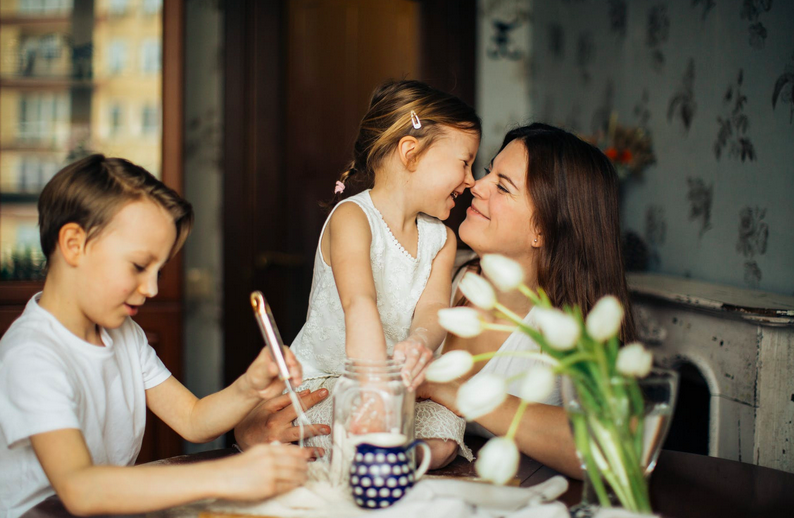One of the really hard things about parenting young kids is that you don’t know what you don’t know. And your kids are too young to tell you. So when your child misbehaves or throws tantrums it’s not easy to discern whether its a health issue, hunger, anger or something else entirely.
For instance does your child regularly have any of these symptoms? Agitation, restlessness, stomach aches, headaches, meltdowns, or refusing to go to school—any of these types of things? My daughter used to have tummy aches in kindergarten but no one told me (I was traveling for work at the time). And I knew she hated a change of plans or having a play date with more than 2 kids. None of those are strange really, but all together as a pattern might make you take note because these could be signs of anxiety.

Join our Community of Peaceful Living Wellness Warriors
and receive a special free gift:
Our Top 5 Tips for Peaceful Living
I have to be honest, I wasn’t looking for anxiety in my 5-year-old. Apparently it comes at all ages, it does not wait for you to become older and it tends to manifest itself as poor behavior that gets more intense as they grow. It sorts of builds on itself and even the best parents can tumble into a negative cycle with their child. It’s heartbreaking to see once you know what you’re looking at; but when you don’t it can be exhausting and sometimes you end up with discipline and yelling because you don’t know how to handle it and they don’t either. So, it can be difficult for all of you and your whole family dynamic.
Essentially, anxiety in children tends to manifest as negative behaviors that you may have glimpsed briefly in the past but are becoming noticeable, consistent and intense. As a mom, that is super frustrating. I couldn’t understand why transitions had to be such an ordeal. I felt totally unable to handle these newly arising attitudes, and didn’t know how to deal with the fact that she was not responding to time outs, nagging, yelling, or any other methods that were supposed to be effective (and not).
Related Post: PARENTING TEENS: Connecting to Intuition
In children, the symptoms of mental health disorders like anxiety often overlap with symptoms of others and it can be very easy to mistake anxiety for a learning disability or an attention deficit disorder. Anxiety and ADHD, at times, often look very much like each other, and it takes a discerning eye to figure out which one it is. And, to complicate things further, sometimes there can be a little bit of both. So how do you know what to look for and when to ask for help?
In addition to the physical manifestations, one big sign can be curiosity. Kids are curious. Very curious. And we like that, we want that, we encourage that. Curiosity leads to interest, to learning, to an engaged child. But sometimes that curiosity sometimes masks anxiety. It took me a while to notice, to see that there was something else going on in my little girl’s head — to see that her questions were morphing into something slightly different. When her “how does or what is” shifted into more “what if’s”. What if this happens, what if that happens.
What if’s can hide — or reveal — fears. My daughter needed to know what was happening, when. Change of plans agitated her; then she’d wonder what if it doesn’t go as planned? What if something goes wrong? Many kids with anxiety have big imaginations which can be amazing to see unfold; the creativity and joy—we don’t want to stifle that, we just want to notice when that big imagination starts filling in questions with worst-case scenarios.
Like with the physical symptoms, one of the things I found to be most effective was to acknowledge what she was feeling. Accepting at face value that they do have the stomach or head ache, or listening to what lies underneath the many questions. They aren’t pretending to get out of something; they are real issues but they’re manifestations of anxiety. Accepting the symptoms as real goes a long way to making our kids feel better. This doesn’t mean agree with her feelings, it means empathizing and helping her understand what she’s feeling. What is definitely not helpful is telling her not to worry, that everything is fine so just get over it. Instead we want to express confidence that they will be ok and they can manage it (with our help).
Paying attention to patterns and learning the triggers for anxiety is crucial to helping them overcome or manage the big emotions. Common triggers are separation—like going to school; transitions and abrupt changes to routines. When you know some of the issues it’s easier to manage them ahead of time.
Related Post: Parenting Corner: 8 Strategies to Motivate Your Child
It’s also important not to cave and let them stay home for example. By helping our kids avoid their fear it reinforces the anxiety and it teaches a poor coping skill.We can’t just run when things don’t go our way or we are out of our comfort zone. Unfortunately avoidance of anxiety is the worst thing to do. If they are scared of dogs, never letting them be near one only extends and reinforces the fear. We need to encourage them to continue facing their anxiety. Why? So, they can learn to feel it, sit with it and let it move through them. The only way to ever get acclimated is to face it and see that they are ok, to build successful experiences in their mind for the next time. That’s how we build resilience and perseverance, even though—in fact because— it’s hard.
One way to help her is to model good coping skills. Let her see you handle a situation where you are anxious or stressed. How do you handle it and how can she handle it if something similar comes up. )So I try walking her through whatever the fear is to get her to reassure herself. Sometimes if it’s easy, I just talk her through the fear to show her she is ok and does have the strength to handle it. Often she’s not feeling confident or is out of her comfort zone. I say, “Looks like you’re pretty worried about this, what can we do to help calm you down? “ Sometimes she can bring herself back with that. Sometimes we have to dance or stomp it out. And other times it comes down to breathing. Just breathing with her. In and out, ever so slowly.
So notice the questions your child is asking; notice if there are triggers before a meltdown; ask some questions of your own. There are many, many answers.
But expecting them to just get over it, isn’t one of them.

DANA BAKER-WILLIAMS
If you’re going to thrive in today’s crazy world, I believe you need to bring your whole self to the table: your personality, your sense of humor, and most importantly, your heart. All of these elements brought me to start Parenting In Real Life, my parent and teen coaching.
I’m a mom of two amazing kids, one of whom has struggled with ADHD, anxiety and depression. Watching this as a parent can be heartbreaking and feels singular. I had nowhere to turn and i was totally overwhelmed. When we finally put the pieces together and got our daughter some help, everything changed for her. But I still didn’t have someone who could teach me how to parent more effectively. It was trial and error on the emotional dysregulation, the panic attacks, and the lack of executive functioning. There was no handbook.
I vowed then that other parents should NOT have to be that scared, overwhelmed, and alone. And kids and teens shouldn’t feel alone, stupid, disconnected or “less than”. Now I am in the position to help parents and teens alike. I help other 2e families find calm in the chaos, connect with their kids, and bring peace and joy back into the family dynamic. I give parents the tools and support they need to communicate and parent more effectively. Simple shifts and techniques will allow you to parent with confidence and handle the challenges with grace and set your kids up for success with life skills, resilience, and self-advocacy.
Bring the joy back in your family, book a call now. https://www.parentinginreallife.org/bookings-checkout/book-a-free-consult/book



